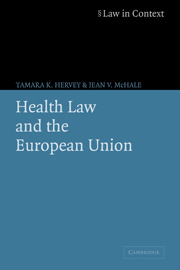Book contents
- Frontmatter
- Contents
- Acknowledgements
- Table of abbreviations
- Table of conventions and treaties
- Table of EU legislation
- Table of national provisions
- Table of cases
- Part One
- Part Two
- 4 Access to health care services
- 5 Data protection and health information privacy
- 6 Regulation of health care professionals
- 7 The regulation of clinical research
- 8 Regulating pharmaceuticals: risk, choice and compensation
- 9 Public health law
- Part Three
- Bibliography
- Index
7 - The regulation of clinical research
Published online by Cambridge University Press: 10 December 2009
- Frontmatter
- Contents
- Acknowledgements
- Table of abbreviations
- Table of conventions and treaties
- Table of EU legislation
- Table of national provisions
- Table of cases
- Part One
- Part Two
- 4 Access to health care services
- 5 Data protection and health information privacy
- 6 Regulation of health care professionals
- 7 The regulation of clinical research
- 8 Regulating pharmaceuticals: risk, choice and compensation
- 9 Public health law
- Part Three
- Bibliography
- Index
Summary
Introduction
This chapter considers the ways in which the EU has become involved in the regulation of clinical research. The concerns of health lawyers with clinical research generally focus on the legal protection given to the rights of the subjects of (or participants in) clinical trials, in the light of a recognition that states have responsibilities to ensure protection of such rights.Post Nuremberg, the legal regulation of research activity has also been seen as a matter of particular concern for international bodies. One of the main drivers in this area is the need to ensure that research practices are ethical.This is reflected in a series of influential statements made by international bodies, such as the World Health Organisation and World Medical Assembly Declaration of Helsinki,and, in a European context, the Council of Europe in its Convention on Human Rights and Biomedicine 1997, and more recently in its draft Additional Protocol on Clinical Research.In the EU context, Community competence to regulate the rights of research subjects can be seen, for example, in various provisions within the Clinical Trials Directive, discussed below. The legal basis of this Directive is Article 95 EC, and Recital 10 explains that harmonised administrative provisions for the conduct of clinical trials are needed in order to ensure effective conduct of such trials in the EU. However, in spite of its apparent harmonisation-based rationale, the Clinical Trials Directive contains a number of provisions with an ethical dimension, and is to some extent framed in a human rights idiom, with particular reference to rights to physical and mental integrity, and privacy.
- Type
- Chapter
- Information
- Health Law and the European Union , pp. 237 - 281Publisher: Cambridge University PressPrint publication year: 2004

